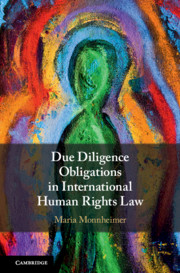Book contents
- Due Diligence Obligations in International Human Rights Law
- Due Diligence Obligations in International Human Rights Law
- Copyright page
- Contents
- Acknowledgments
- Abbreviations
- Introduction
- 1 Why to Analyze State Responsibility for Human Rights Violations: The Flawed Debate on Direct Human Rights Obligations for Non-State Actors
- 2 Establishing State Responsibility for Human Rights Violations: Proposal for a Conduct-Based Typology of Human Rights Obligations
- 3 The Origins of Due Diligence in International Law
- 4 The Components of the Due Diligence Standard
- 5 Lessons to Be Learned from the Application of Due Diligence Obligations in Other Fields of International Law
- 6 Applying the Due Diligence Framework to the Field of Human Rights Protection
- 7 A Case for Extraterritorial Due Diligence Obligations in the Human Rights Context
- Summary and Outlook
- Index
Summary and Outlook
Published online by Cambridge University Press: 05 February 2021
- Due Diligence Obligations in International Human Rights Law
- Due Diligence Obligations in International Human Rights Law
- Copyright page
- Contents
- Acknowledgments
- Abbreviations
- Introduction
- 1 Why to Analyze State Responsibility for Human Rights Violations: The Flawed Debate on Direct Human Rights Obligations for Non-State Actors
- 2 Establishing State Responsibility for Human Rights Violations: Proposal for a Conduct-Based Typology of Human Rights Obligations
- 3 The Origins of Due Diligence in International Law
- 4 The Components of the Due Diligence Standard
- 5 Lessons to Be Learned from the Application of Due Diligence Obligations in Other Fields of International Law
- 6 Applying the Due Diligence Framework to the Field of Human Rights Protection
- 7 A Case for Extraterritorial Due Diligence Obligations in the Human Rights Context
- Summary and Outlook
- Index
Summary
The growing importance of non-state actors challenges the traditional inter-state order of public international law. In many respects, the reciprocal logic undergirding state responsibility is difficult to apply and high thresholds for attributing non-state conduct complicate matters even further, which stands in stark contrast to the increase in power on behalf of non-state actors, in particular where they operate in countries that lack the capacities to effectively regulate and control private actions. International law’s traditional way to fill these accountability lacunae has been the recognition of due diligence obligations that require states to diligently prevent and sanction harmful private conduct.
- Type
- Chapter
- Information
- Due Diligence Obligations in International Human Rights Law , pp. 322 - 326Publisher: Cambridge University PressPrint publication year: 2021

